
Raspberries have got to be one of my favorite fruits. When I got my first Guinea Pig Sandy, I was eating some and he was sniffing them.
He managed to get one and made a lot of happy noises whilst eating it.
But can guinea pigs eat raspberries?
I wanted to find out before I gave him anymore, just in case he shouldn’t have had one.
I’m glad I checked…more on this below.
In this article, we will explore the serving size for guinea pigs, as well as the risks and benefits of eating raspberries.
Can Guinea Pigs Eat Raspberries?
The quick answer is yes, Guinea Pigs can eat raspberries.
However, there are a few things to consider before feeding them this fruit.
You should add them to your guinea pigs diet as a treat. They’re full of dietary fiber and vitamin C.
They should be limited to small servings due to the sugar content and other minerals that could cause health issues for your guinea pig if they eat too many.
What Is The Nutritional Value of Raspberries
Raspberries are a good thing for your guinea pigs to eat, since they’re very nutritious.
Guinea Pigs tend to overeat if they can, luckily raspberries are low in unhealthy fats. Which can help reduce the chance of them becoming obese.
They are high in antioxidants, which is great for your guinea pig. This includes Vitamins B6, E, C, A and K. All of which are good for your Guinea Pigs and their diets.
100 grams will give you roughly 52 kcal of energy. (U.S Department of Agriculture)
Raspberries contain the following;
| Typical Values | 100g contains |
| Energy | 133kJ / 32kcal |
| Fat | 0.3g |
| Saturates | 0.1g |
| Carbohydrate | 4.6g |
| Sugars | 4.6g |
| Fibre | 2.5g |
| Protein | 1.4g |
| Salt | 0g |
| Vitamin C | 32.0mg (40%NRV) |
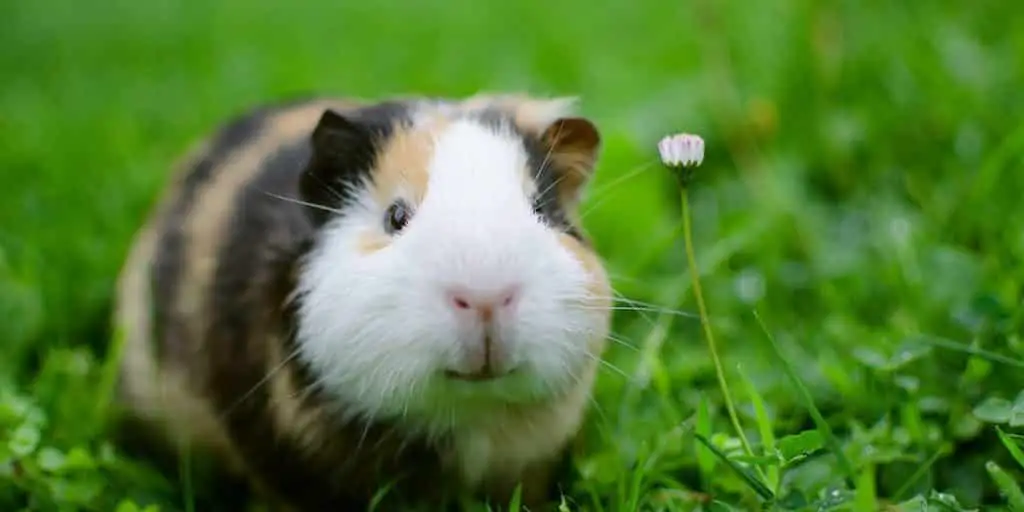
Vitamin C
Guinea Pigs are not able to produce their own Vitamin C, so it’s an essential nutrient to get into their diet.
Raspberries are full of Vitamin C, with 100 grams having roughly 26.2mg of Vitamin C.
It’s an essential nutrient to help your guinea pigs body grow and develop. It also helps to repair their body tissues.
Fiber
In order to have a good digestive system, guinea pigs need fiber in their diet. It helps to balance out the bacteria in the gut.
It also helps keep our guinea pigs healthy in other ways, such as controlling blood sugar levels.
Sugar
Now sugar is both a good thing and bad thing for our guinea pigs. It’s essential as it helps to give them the energy needed to function.
However too much can cause long term issues such as obesity and diabetes, which is not good for them.
Since Raspberries contain 4.42 grams per 100 grams of raspberries, it’s important that you limit the amount given to your guinea pig.
Vitamin A
Guinea Pigs need a decent amount of Vitamin A in their diet. Raspberries have a small amount, which is good to help increase the amount they get.
Vitamin A is important for eye development, and helps to keep their eyes healthy. A lack of Vitamin A could result in weight loss and even death in extreme cases.
Protein
Just like humans, guinea pigs need protein in order for their bodies to function correctly.
Its actually one of three macronutrients that are essential.
Protein is very important to the body because it does many different things. Luckily most food does contain a decent amount of protein for your guinea pig.
Although giving Raspberries as a treat, will ensure they get that little bit more.
Fat
Fat is important in any diet, although too much is not a good thing.
Raspberries do only contain a small amount of fat, with 0.65 grams of fat in 100 grams of raspberries.
Calcium
Calcium is an essential mineral for guinea pigs and many do tend to have a deficiency.
In fact pregnant/nursing guinea pigs tend to suffer from a very low level of calcium.
Calcium helps with the bones and tissues, so it’s important to keep the level balanced.
Raspberries do have a decent amount of calcium in them. 25mg per 100 grams of raspberries.
Magnesium
Because of their size Guinea Pigs can suffer from diabetes. Magnesium is said to help prevent type-2 diabetes in Guinea pigs.
Another benefit is that it helps to keep their muscles healthy and reduce pain.
Roughly 100 grams of raspberries contains 22 mg of Magnesium.
Potassium
Potassium has a number of benefits to Guinea Pigs and raspberries are full of them. 100 grams contains 151 mg of potassium.
They need potassium as it helps with brain function but also helps protect their kidneys.
Now if your guinea pig has already had kidney issues, they shouldn’t add more potassium to their diet.
Iron
Iron is very important to Guinea pigs, its one of the most important minerals. Having a lack of iron can result in your guinea pig becoming anaemic.
There is roughly 0.69 grams of iron in 100 grams of raspberries. This results in a nice supplement of iron to help your blood carry more oxygen.
Sodium
Finally there is Sodium. It’s an essential mineral.
Sodium is an important mineral for guinea pig brains, because neurons can’t work properly without it.
Health Benefits of Raspberries For Guinea Pigs
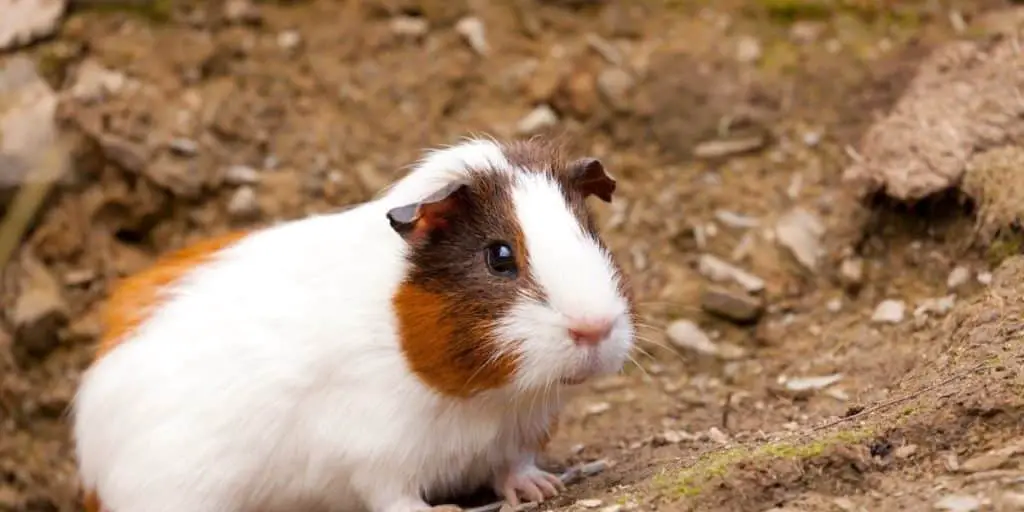
By eating Raspberries, Guinea Pigs get a lot of essential nutrients and minerals. As mentioned these include Vitamin C, fiber and a range of antioxidants.
There are many health benefits for your guinea Pig by consuming raspberries. So let’s go into detail on them;
Prevention of Scurvy
Raspberries are a fruit that Guinea Pigs can eat to stay healthy.
They contain Vitamin C, which helps the guinea pig’s skin stay healthy by making collagen. Scurvy is when there is not enough Vitamin C in the diet of a Guinea Pig.
Vitamin C prevents scurvy and other health complications of guinea pigs.
Giving your Guinea Pig raspberries is a good idea because they are rich in vitamin c which is what will help to prevent scurvy.
According to veterinarians, piggies need 10-50 mg of Vitamin C per day depending on several factors.
if your Guinea Pig is not eating enough fruit and vegetables, you might want to check them for scurvy.
Keep a look out for symptoms such as;
- Loss of weight
- Loss of appetite
- Lack of energy
- Dental issues
- Diarrhea
- Brushing
- Hair Loss
Healthy Heart
The great thing about raspberries is that they help improve your guinea pigs blood flow. Helping to circulate the blood properly around their bodies.
This in turn helps to give your Guinea Pig a healthy heart.
One health issue that guinea Pigs can experience as they get older or don’t have the right diet is heart attacks.
Raspberries help to prevent this by reducing their blood pressure.
So time to let your piggy eat some tasty raspberries.
Hydration
Guinea Pigs require plenty of water to stay healthy, just like with any pet.
Giving your Guinea Pig Raspberries to eat, can help them to stay hydrated.
Ill explain why…
If your guinea pig doesn’t have plenty of water then it can become dehydrated. This can happen even more in the summer months when it’s hotter.
Dehydration can induce serious health problems or even death in your guinea pigs if they don’t get enough water.
In fact, they only need to be slightly dehydrated to become poorly. (Another reason why they should have bottled water at all times)
So how does eating raspberries help with hydration?
Raspberries are 85% water, so naturally by eating some of these can be a good way of giving them that extra needed hydration. Plus they love the taste of them.
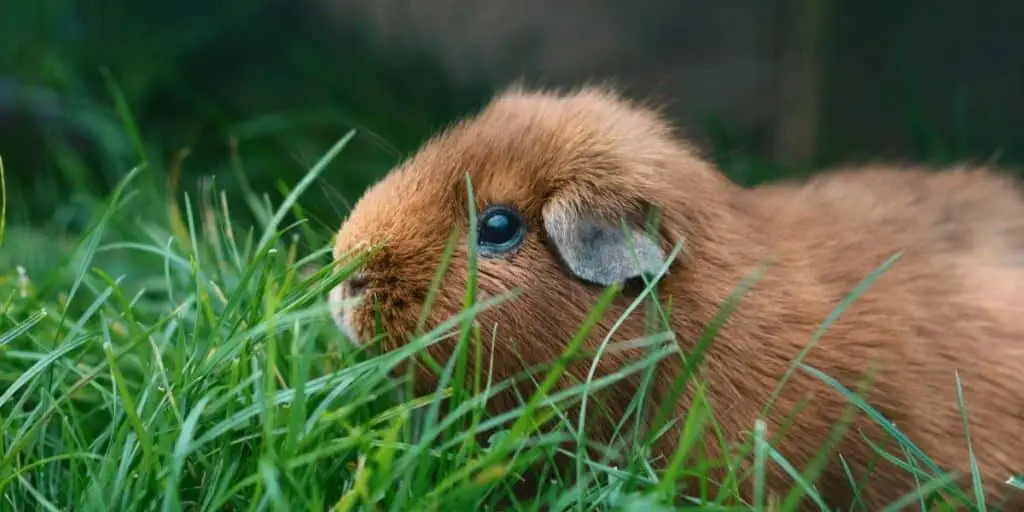
Fighting Disease
By eating Raspberries, Guinea Pigs can help strengthen their immune system. This can help protect them from diseases.
This is because of the high Vitamin C content.
Raspberries also help to prevent things such as;
- Diabetes
- Obesity
- High cholesterol
It does this because of the high fiber content.
Healthy Blood
Guinea Pigs should eat raspberries because of the potassium and iron content.
These help keep the blood healthy, which not only helps prevent high blood pressure it also help organ and tissue health.
Since guinea pigs are prey animals, they tend to get scared easily when they dont know if another animal is a predator. This makes them prone to heart attacks.
Healthy blood will help to reduce the chance of them having a heart attack.
Healthy Gut
An important part of a guinea pigs diet is the fiber content. They need a decent amount to help prevent gut related issues and help give them a healthy digestive system.
Luckily raspberries are full of fibers.
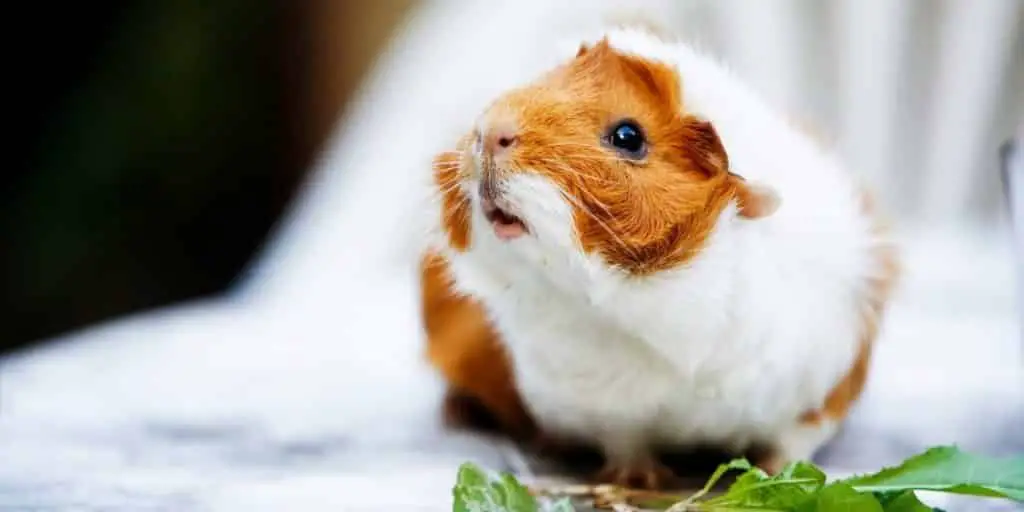
Risks of Guinea Pigs Eating Raspberries
With so many benefits, you can see why its a good idea to let your guinea pigs eat raspberries.
It’s really important that you don’t overfeed them though. Below are some of the potential health impacts by giving them too many.
Urinary Problems
Baby guinea pigs need calcium to help them grow and develop.
Too much calcium in adult guinea pigs can cause health problems.
There has been links too high amounts of calcium causing urinary stones or urinary tract infections in Guinea pigs.
Since Raspberries do contain calcium, its important they don’t eat large amounts.
Cramps and Gas
The fiber content in raspberries is a good thing, however combined with the sugar it can have some negative effects.
Eating too many can cause issues with the guinea pigs digestive system.
They can actually cause them to get cramps, pain and even increased gas.
Hypoglycaemia
Hypoglycaemia is a condition that is caused by a low level of blood sugar. This can lead to a variety of issues with your guinea pig such as severe weight loss. Which can then lead to more complex issues.
They can develop Hypoglycemia if they consume too much sugar on a daily basis.
Since many fruits including raspberries have a high sugar content, they need to be eaten in moderation.
Diabetes
Unlike some animals, it’s not common for Guinea Pigs to get diabetes.
Although if they do eat a lot of high sugar content foods, they could develop it.
If your guinea pig eats raspberries on a daily basis, this could increase their sugar levels too much.
So remember even though they like them, let your guinea pig eat raspberries in moderation.
Weight Gain
Usually raspberries will not cause Guinea Pigs to gain weight. Although if left unchecked and ate too many then there is a chance.
Weight gain usually happens when eating foods that are higher in carbs and sugar. A little weight gain is not bad for Guinea Pigs but becoming overweight could be fatal.
Pesticides
Pesticides are something that can really impact the health of your guinea pigs. They are often used to help raspberries grow and keep any pests such as flies off.
When it comes to raspberries, its said that they can be covered in pesticides. If your guinea pig eats too many raspberries that have not been properly cleaned, it could cause severe health problems such as cancer.
Make sure you wash any raspberries before you give them to your Guinea Pig.
Can a Baby Guinea Pig Eat Raspberries?
No baby guinea pigs cannot eat raspberries. Their digestive systems are very delicate and it’s important to follow a strict diet.
Baby guinea pigs can eat only their mother’s milk in the first few weeks. You should start feeding them alfalfa hay and pellets after a while.
You could then start to introduce some fruit and vegetables but take it slowly.
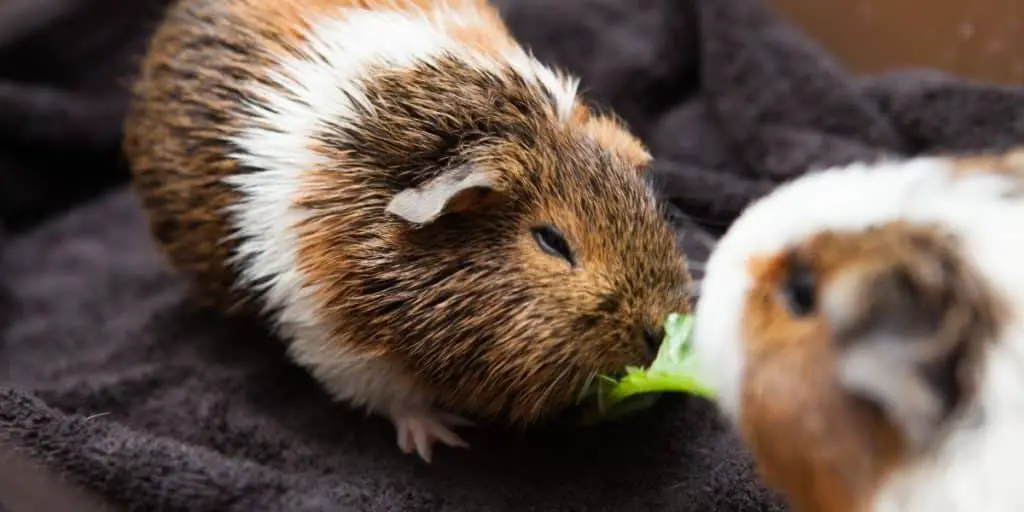
Can Guinea Pig Eat Frozen Raspberries?
No, Guinea Pigs cannot eat frozen raspberries.
More often than not fruits that you buy already frozen have an increased amount of sugar content, as well as preservatives to make it last longer.
Its also very hard to wash frozen raspberries, so you don’t know if all of the pesticides have been properly removed.
If they are raspberries that you’ve frozen from fresh then they can have them. You just need to make sure that you have fully defrosted them first.
I’d also recommend getting them to room temperature, so the cold doesn’t damage the guinea pigs teeth.
Can Guinea Pigs Eat Dried Raspberries?
No you should not give your Guinea Pigs dried raspberries.
They tend to have more sugar added to them as well as other additives.
Plus when these are dried, they lose all of the nutritional value. So your Guinea Pig is not getting the potential health benefits they would get with fresh raspberries.
Avoid dried raspberries and any other dried fruit as well. Stick to fresh raspberries,
Can Guinea Pigs Eat Raspberry Leaves?
Yes they can eat raspberry leaves, they aren’t poisonous to guinea pigs.
They generally don’t have anything harmful in them, although they do still have some calcium in them.
So only give them in moderation.
It’s also worth noting that the leaves tend to have pesticides on them. Make sure you fully wash them before giving them to your Guinea Pigs.
Can guinea pigs eat raspberry juice?
No guinea Pigs shouldn’t have raspberry juice. The problem with the juice is that it tends to have a much higher sugar content.
Due to this high concentration of sugar, it could have a negative impact on the health of our Guinea Pigs.
Can guinea pigs eat canned raspberries?
No, guinea pigs cannot eat canned raspberries.
Canned fruit needs to last longer than fresh, therefore preservatives are added to make it last. These could be harmful to your Guinea Pig.
The canned raspberries also tend to be sweeter as they’ve had a lot of extra sugar added to them. Which along with the extra salt can cause some potential fatal problems.
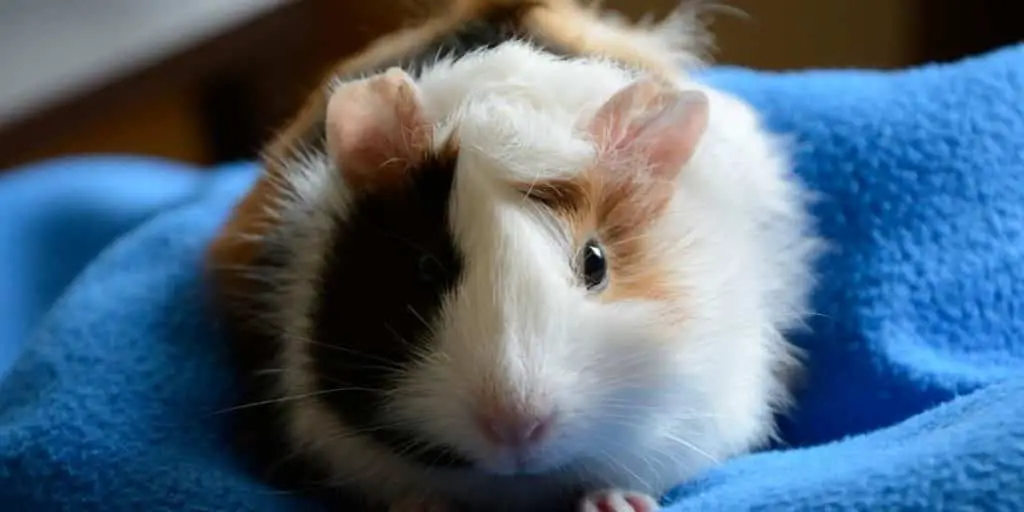
Can Guinea Pigs Eat Raspberries Daily?
No, its not a good idea for your guinea pig to eat raspberries daily. There are a number of health concerns that can come from eating too many raspberries, so you should limit the amount of times you give your guinea pigs them.
You could give your Guinea Pig raspberries once or twice a week, this should only be given as a treat.
It’s really important that they do have a mixed and varied diet.
How Many Raspberries Can Guinea Pigs Eat?
Guinea pigs can eat two or three raspberries.
It’s important that you do limit the amount of raspberries that your Guinea Pig eats. As you now know there are plenty of benefits but also some downsides to raspberries.
How To Feed Raspberries To a Guinea Pig?
Guinea pigs should not eat raspberries too often, even though they’re not toxic to them. They shouldn’t eat too many, you will want to limit how many they have.
If Guinea Pigs eat them every day, this could cause some issues. a couple of times a week would be better. You should also give them other fruits and vegetables to help give them a balanced and varied diet.
When they do eat raspberries, give them one or two raspberries per serving. This is more than enough to get the benefits and prevent them from getting any health issues.
There are a few things you need to consider before your Guinea Pig eats raspberries;
- Make sure the raspberry is ripe
- Wash the raspberries before they eat them
- Cut raspberry into small pieces – never give them whole.
Other Fruits That Guinea Pigs Can Eat
So Guinea Pigs can eat raspberries but you might want to give them something different or compliment them with something else.
It’s important to give them fruits and vegetables as treats, since they contain a lot of nutrients that can benefit their overall health.
Some other great fruit that Guinea Pigs can eat are;
- Oranges
- Apples
- Bananas
FAQ
Are Raspberries Poisonous To Guinea Pigs?
Raspberries are not poisonous for guinea pigs, but too much sugar could lead to health risks or even death if consumed daily.
Can Guinea Pigs Eat Raspberry Stems and Leaves?
Yes they can, they don’t need to be limited as much either as the leaves don’t contain any sugar content.
How Many Raspberries Can My Guinea Pig Have?
You should limit them to only having 1-2 per week. You can always give them other fruit and vegetables to help give them some extra treats.
Final Thoughts
So can guinea pigs eat raspberries? Yes guinea pigs can!
Your furry friend will be happy to know that raspberries are a healthy treat for them too.
You can share some with your pet guinea pig once per week, but they should only have one or two due to the sugar content and high calcium levels in these berries.
These fruits also provide Vitamin C, A, fiber (to help their digestion), and nutrients which helps with heart health as well as preventing scurvy, dehydration and other diseases.
Raspberries make an excellent snack alternative for pets because of how nutritious they are!


